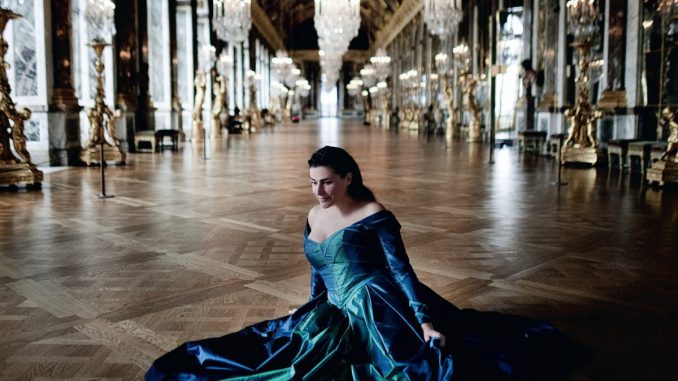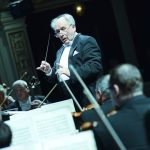by Helena Havlíková
What does the president position of Europa Nostra mean to you?
As a European citizen and someone who has dedicated most of my life to cultural heritage, I feel extremely privileged to be President of Europa Nostra – the European Voice of Civil Society Committed to Cultural Heritage. I fully subscribe to Europa Nostra’s mission which is based on the assertion that cultural heritage is vital for our economy, our society, our culture, our environment, our well-being and for the future of Europe. This is why we, as European citizens, must take full responsibility for transmitting this heritage to future generations. It is an organisation which inspires me and enriches my own work as musician. I am therefore delighted to contribute to the implementation of Europa Nostra’s goals for the benefit of Europe’s invaluable heritage and also of Europe’s citizens.
Did you hesitate to accept this function with your busy schedule?
Not really. It is not in my character to do anything half-heartedly. Everything I do, I put all my soul into it. As already explained, I perceive my professional career and my voluntary engagement as President of Europa Nostra to be complementary. Of course, being the President of Europa Nostra is not an executive position. Fortunately, I can count on the competent and dedicated team of Europa Nostra led by its Executive President, Prof. Dr. Hermann Parzinger, and Secretary General, Sneška Quaedvlieg-Mihailović, who has supported me every step of the way.
As anyone who works in classical music will tell you, you always have to work, study, research and cooperate closely with others to create something worthwhile, something that does justice to the talent and the vision of the composers, lyricists and musicians. Art, music, and cultural heritage – this is not something that can thrive in isolation; everything you accomplish is always based on a cooperation and team effort. That is also the case at Europa Nostra.
What do you see as the contribution / benefit /asset of Europa Nostra?
Cultural heritage brings meaning, joy and hope to so many people at so many places every single day. I see this in the eyes and smiles of the audiences at every concert and every cultural project I have ever been involved in. We may not always realise it, but almost every aspect of our lives is infused with cultural heritage. It is not just about music, literature, art or monuments; it is part of the food we eat, the values, the rules and laws we live by, our traditions and habits. Europa Nostra, as the most representative European heritage civil society organisation, celebrates and champions cultural heritage as a strategic resource for a better future for our Europe. Cultural heritage is the core foundation of the entire European project; it is the essence of what it means to be a European. If we want to achieve a more sustainable, more inclusive and more beautiful Europe, we must put culture and cultural heritage at the very heart of our strategies and priorities. Europa Nostra’s task is to be a forceful advocate of this key message. We celebrate excellence through our annual European Heritage Awards / Europa Nostra Awards, organised together with the European Commission. Last year these Awards were handed out at a memorable ceremony held at the iconic State Opera in Prague at the end of September, within the official programme of the Czech Presidency of the European Union. We also campaign to save Europe’s most threatened heritage through our 7 Most Endangered Programme, run in partnership with the European Investment Bank Institute. In short, Europa Nostra’s contribution is vital, and I am grateful to help in any way I can.
Do you already have an idea of how and in which direction you would like to focus Europa Nostra’s activities?
As you know, I have been working in the cultural field already for a substantial amount of time. I can look at Europa Nostra with the eyes of a performer, but also with the eyes of a producer, a fundraiser and a cultural manager. I hope I can invest this multifaceted experience to inspire and help sharpen Europa Nostra’s vision and action for the future. Thanks to the expertise and commitment of our Europa Nostra members, supporters and partners, I am confident that we have a very solid foundation for meeting new challenges. The key to our further success is through raising awareness at every level, to demonstrate how cultural heritage – tangible and intangible – can help build a better and a more sustainable Europe.
In the context of the pressing challenges facing our continent and our planet – from the increasing threats to democracy, peace and solidarity all over Europe, to the dramatic impact of climate change on our society and living environment – we need to promote a “Value-based and Culture-driven Europe”. This is precisely the motto of our Prague Manifesto, which contains the key policy messages formulated during our European Cultural Heritage Summit 2022 held in the beautiful city of Prague where I look forward to performing on 7 May 2023 at the stunning art-nouveau Smetana concert hall.
Europa Nostra’s Strategic Plan “Horizon 2025” puts forward our goals and ambitions for the next years. One of our projects is the creation of Heritage Hubs in several European cities, starting with Krakow and Athens, to be expanded further hopefully in Lisbon and also in Venice where we shall celebrate the 60th anniversary of Europa Nostra on 28-29 September 2023.
Before you became President, were you aware of the existence of Europa Nostra and did you ever meet results of Europa Nostra’s activities? It seems that the wider public is not yet sufficiently aware of the mission of Europa Nostra – while the possibilities offered by Europa Nostra are considerable. Do you also feel this “knowledge gap”?
I was definitely aware of the existence of Europa Nostra. There are many important winners of the European Heritage Awards / Europa Nostra Awards in my native Italy and a very good friend of mine, Léonard Gianadda was a proud winner in Switzerland. However, I must admit that I was not fully aware of the large variety and extent of the work of the organisation. It has been an inspiration to learn more about Europa Nostra’s work and achievements during its almost 60 years of existence. The awareness and appreciation of Europa Nostra is very high in the European Union and in many European countries, as well as in the Council of Europe and UNESCO. Europa Nostra is also very well-known in the wider European heritage field: more than 500 winners of our European awards can attest to that. But we certainly can and should do more to reach out to the wider public, with the help of media like yours.
You were born in Italy, you are the artistic director of the Salzburg Whitsun Festival since 2012 until 2026, you have lived in many places , you perform all over the world. Do you feel like an Italian, an Austrian, a Swiss, a European – or does such a national division make no sense for you?
My own cultural roots and heritage profoundly marked my thinking, my feelings, my music and my personality, before even I have become aware of it. Over the years, I was fortunate enough to be able to add additional cultural layers to the original Italian roots of my identity: Spanish, French, Swiss, Austrian, and many more. They made me see the immense value of our shared heritage, which in Europe is so rich and diverse but at the same time so profoundly intertwined. What else can I say? I love Bach as much as Verdi or Dvorak and as much as Smetana or Lully. And I strongly believe that many people in Europe feel the same.
Politicians sometimes tend to relegate culture to the background. How is culture important?
Yes, culture is still seen – far too often – as a luxury, while it is a necessity. The quality of our life and living environment are shaped through and by our culture and cultural heritage. Europa Nostra’s essential mission is to help put cultural heritage where it belongs: at the very heart of our policies – from the local level to European level.

In your experience, what are the effective funding models for culture?
That is a complex question. Obviously, the major segments of culture and cultural heritage need to be supported by public authorities at the local, national and European levels. On the other hand, there are many ways in which culture and cultural heritage can be part of viable private enterprises. It is clear that investing in culture and cultural heritage has many benefits not only for our society and our communities but also for our economy. Cultural organisations and artists should continue to develop creative solutions of public-private partnerships that can inspire others to follow their power of example. And private foundations and donors will hopefully continue to support culture, since their generous and visionary contributions are also playing an invaluable role in the wider field of culture and education.
Among last year’s laureates of the European Heritage Award / Europa Nostra Awards are a number of volunteers, amateurs who take care of cultural heritage in their free time as a hobby. You are a top professional. From your point of view – what is the role of these volunteers for the development of culture and heritage?
The cultural heritage field needs top professionals with their immense knowledge and varied skills. At the same time, it also needs volunteers with their generosity, passion and dedication. Voluntary work is the backbone of the entire cultural world. Many of these volunteers are highly skilled and talented. Many of our award-winning projects would not have been possible without the generous and tireless efforts of hundreds of volunteers. As President of Europa Nostra, I am also an enthusiastic volunteer! All members of the Board and Council of Europa Nostra as well as all members of the Juries of our Awards and all members of our 7 Most Endangered Advisory Panel also work as volunteers. Without volunteers, a non-profit organisation like Europa Nostra, which is value-based and member-driven, could not survive. Many of those volunteers are also generous donors, individually or through various forms of philanthropic organisations. Their vital role also needs stronger recognition and support.
The COVID-19 pandemic first and then now also the Russian invasion of Ukraine are inflicting heavy blows on culture as well. Do you believe that people will return to theatres, concert halls, cinemas, exhibitions, museums, libraries…?
Yes, of course. There is no doubt in my heart. As European Commissioner Mariya Gabriel said during our European Cultural Heritage Summit in Prague, culture is the oxygen of our society. The COVID-19 pandemic was incredibly difficult for many people working in the sector, both financially and emotionally. It was also difficult for people who could not go to their favorite opera houses, concert halls, theatres and cinemas. Today, as we are emerging from the pandemic, the public is definitely embracing and engaging again with performing arts and with cultural heritage. I therefore remain very hopeful about the resilience and the future of the cultural sector. Because I am deeply convinced that humanity cannot survive without the creative energy and without the inspirational and healing power of art, music and cultural heritage.
During your stellar career, you have experienced moments of happiness, but certainly alas difficult moments. How did you overcome them?
The life of each human being is made of successes and failures; moments of happiness and joy but also moments of sadness and loss. We learn from each of these moments. They all make who we are. What is important that we never stop being positive and never stop loosing hope. And above all, it is important that we never stop enjoying music, art and cultural heritage which help us become better and wiser human beings.




